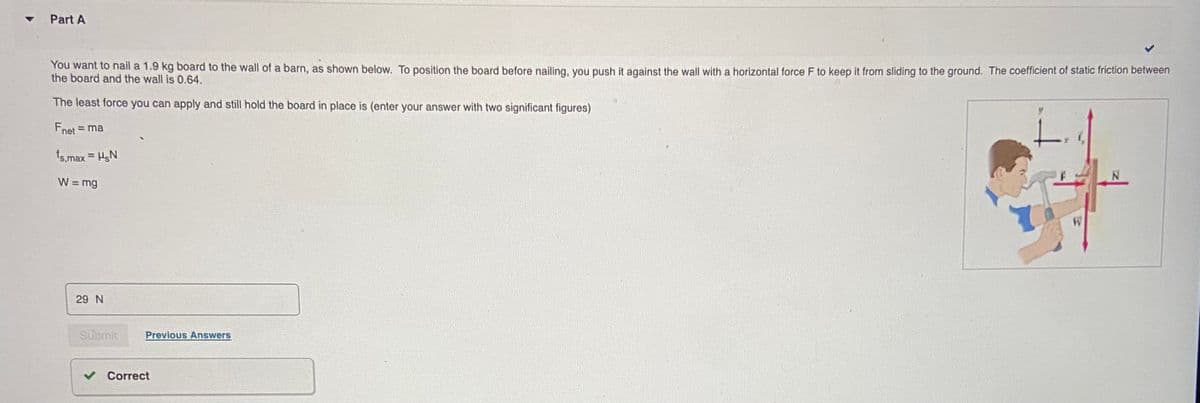Part A You want to nail a 1.9 kg board to the wall of a barn, as shown below. To position the board before nailing, vou push it against the wall with a horizontal force F to keep it from sliding to the ground. The coefficient of static friction betwee the board and the wall is 0.64. The least force you can apply and still hold the board in place is (enter your answer with two significant figures) Fnet =ma tmax = HN W = mg 29 N Submit Previous Answers v Correct
Part A You want to nail a 1.9 kg board to the wall of a barn, as shown below. To position the board before nailing, vou push it against the wall with a horizontal force F to keep it from sliding to the ground. The coefficient of static friction betwee the board and the wall is 0.64. The least force you can apply and still hold the board in place is (enter your answer with two significant figures) Fnet =ma tmax = HN W = mg 29 N Submit Previous Answers v Correct
University Physics Volume 1
18th Edition
ISBN:9781938168277
Author:William Moebs, Samuel J. Ling, Jeff Sanny
Publisher:William Moebs, Samuel J. Ling, Jeff Sanny
Chapter6: Applications Of Newton's Laws
Section: Chapter Questions
Problem 111AP: A crate of mass 100.0 kg rests on a rough surface inclined at an angle of 37.0with the horizontal. A...
Related questions
Question

Transcribed Image Text:Part A
You want to nail a 1.9 kg board to the wall of a barn, as shown below. To position the board before nailing, you push it against the wall with a horizontal force F to keep it from sliding to the ground. The coefficient of static friction between
the board and the wall is 0.64.
The least force you can apply and still hold the board in place is (enter your answer with two significant figures)
Fnet = ma
fs,max = HsN
W = mg
29 N
Submit
Previous Answers
Correct

Transcribed Image Text:Part B
Two reasons we know that the force of static friction does not increase when you push harder than the force calculated in PART A. are (choose the best answer)
O if you push too hard the wall will break and the value of ue between the board and the wall increases as you push harder, but it cannot exceed 1.
once fs reaches fs.max it cannot increase any further and the board would accelerate upwards if you could push hard enough to make f, exceed the weight of the board (We know this does not happen.).
once fs reaches fs.max it cannot increase any further and the value of u, between the board and the wall increases as you push harder, but it cannot exceed 1.
the value of u, between the board and the wall increases as you push harder, but it cannot exceed 1 and the board would accelerate upwards if you could push hard enough to make fg exceed the weight of the boara (We
know this does not happen.).
O if you push too hard the wall will break and the board would accelerate upwards if you could push hard enough to make f, exceed the weight of the board (We know this does not happen.)
O if you push too hard the wall will break and once f, reaches fsmax it cannot increase any further.
s,max
Submit
Previous Answers Request Answer
X Incorrect; Try Again; 3 attempts remaining
Expert Solution
This question has been solved!
Explore an expertly crafted, step-by-step solution for a thorough understanding of key concepts.
This is a popular solution!
Trending now
This is a popular solution!
Step by step
Solved in 2 steps

Recommended textbooks for you

University Physics Volume 1
Physics
ISBN:
9781938168277
Author:
William Moebs, Samuel J. Ling, Jeff Sanny
Publisher:
OpenStax - Rice University

College Physics
Physics
ISBN:
9781285737027
Author:
Raymond A. Serway, Chris Vuille
Publisher:
Cengage Learning

University Physics Volume 1
Physics
ISBN:
9781938168277
Author:
William Moebs, Samuel J. Ling, Jeff Sanny
Publisher:
OpenStax - Rice University

College Physics
Physics
ISBN:
9781285737027
Author:
Raymond A. Serway, Chris Vuille
Publisher:
Cengage Learning